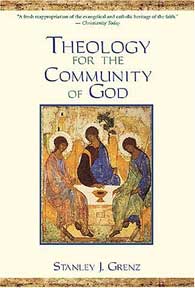Multimedia • Reference • Religion • Travel |
 Theology for the Community of God Stanley J. Grenz
Description From The Publisher: This proven systematic theology represents the very best in evangelical theology. Stanley Grenz presents the traditional themes of Christian doctrine— God, humankind, Christ, the Holy Spirit, the church, and the last things—all within an emphasis on God’s central program for creation, namely, the establishment of community. Masterfully blending biblical, historical, and contemporary concerns, Grenz’s respected work provides a coherent vision of the faith that is both intellectually satisfying and expressible in Christian living. Available for the first time in paperback. Reviews A fresh reappropriation of the evangelical and catholic heritage of the faith. —Christianity Today A significant contribution to systematic theology. . . . An excellent and indispensable textbook for courses in Christian theology. —Francis Schüssler Fiorenza Clear, well-informed, up-to-date, and firmly anchored in the mainstream of Christian wisdom. . . . An outstanding achievement. —J. I. Packer Theology for the Community of God signals a clear turning of the corner for evangelical systematics. —Scottish Journal of Theology
Reader's Index Send us your favorite quotes or passages from this book. About the Author Stanley J. Grenz is the Pioneer McDonald Professor of Baptist Heritage, Theology, and Ethics at Carey Theological College and Professor of Theology and Ethics at Regent College in Vancouver, British Columbia. Grenz has published twenty books, six of which are award-winners, and he is currently a consulting editor for Christianity Today. Table of Contents
Introduction: The Nature and Task of Theology The Theological Task Theological Method Part 1: Theology: The Doctrine of God The Reality of God in an Era of Atheism Knowledge of God in an Era of Agnosticism Trinitarian Doctrine in Theological History The Formulation of Trinitarian Doctrine The Theological Implication of Trinitarian Doctrine Trinitarian Doctrine and Christian Life The Nature of the Relational God The Divine Attributes God as the Creator of the World God as the Providential Administrator of the World Part 2: Anthropology: The Doctrine of Humanity Our Place in Creation "Openness to the World" and General Revelation God as Our Origin Our Temporal Origin Our Ontological Nature Humans as the Image of God The Nature of Sin Original Sin The Results of Sin: Our Human Situation The Nature of the Spiritual Realities Angelology and Structures of Existence The Demonic and Superstition Part 3: Christology: The Docrtine of Christ Foundations: Jesus, the Divine One Implications: Jesus as One with God Jesus as a Human Jesus as the True Human Jesus as the Universal Human Jesus as Divine and Human The Incarnation The Virgin Birth The Vocation of the Earthly Jesus The Atonement and the Mission of Jesus The Ongoing Work of Christ Part 4: Pneumatology: The Doctrine of the Holy Spirit The Spirit in Salvation History The Spirit in the Trinitarian Life The Spirit as the Foundation of Scripture The Task of the Spirit Speaking through Scripture The Bible and Revelation Biblical Authority The Individual Aspect of Conversion The Divine Aspect of Conversion The Community Aspect of Conversion The Process of Salvation The Eternal Context of Salvation Part 5: Ecclesiology: The Doctrine of the Church The Church as a Covenant People The Church as the Sign of the Kingdom The Church as Community The Purpose of the Church The Mandate of the Church Acts of Commitment and the Church Baptism: The Seal of Our Identity The Lord's Supper: Reaffirming Our Identity Membership in the Community Community Membership in the First CenturyBaptism and Community Membership Baptism after the First Century Community Structures Leadership for the Community Ordination by the Community Part 6: Eschatology: The Doctrine of Last Things The Significance of Death Overcoming Death in the Resurrection Hope in the Face of Death The Meaning of History The Presence of Community in and beyond History The Climax of History The Transition from Creation to New Creation The Dark Side of the Judgment The New Creation Eschatology as Insight into the Present Eschatology as God's Call in the Present Eschatology as Insight for Living Indexes Subject Index Customer Reviews Write your own online review. Look for Similar Books by Subject | |||||||
Copyright ©1996-2008 CenturyOne Bookstore. All Rights Reserved. All prices subject to change and given in U.S. dollars. Your purchase from CenturyOne.com will assist the CenturyOne Foundation in providing funding for various archaeological and research projects which seek to provide more information about the period of the First Century C.E., the origins of Christianity and the world of the Bible in general. All materials contained in http://www.centuryone.com are protected by copyright and trademark laws and may not be used for any purpose whatsoever other than private, non-commercial viewing purposes. Derivative works and other unauthorized copying or use of stills, video footage, text or graphics is expressly prohibited. |

